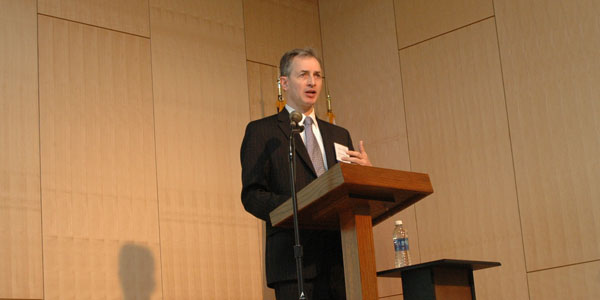
The federal government wants businesses to think globally, not just in terms of products, but in terms of customers.
The reason for this initiative is that the market for exporting goods and services is expanding. Congress last year passed free trade agreements (FTA) with Korea, Panama and Colombia. The agreements make it easier for exporters and international service provides to do business within those countries.
“We”™re hoping that U.S. businesses will take advantage of those opportunities, and in turn that would create jobs,” Bennett Harman, deputy assistant U.S. trade representative for Latin America, told area business leaders at an event sponsored by the Westchester County Association at Westchester Community College”™s Gateway Center.
“If we don”™t have our companies speaking in global terms, they are not only missing out, but they”™re not realizing the U.S. is part of a global society. If they want to compete they have to do so not just here but elsewhere,” Harman said.
Those who have already started thinking globally have benefitted from the substantial pool of money tied to the international market. According to the International Trade Administration (ITA), New York”™s metropolitan area exported shipments of merchandise in 2011 totaling $84.9 billion. The state”™s biggest international client is Canada. The ITA revealed merchandise exports of more than $16 billion to Canada last year. Hong Kong was the second-biggest importer of New York goods and services with sales totaling $8.1 billion.
The ITA also revealed 28,930 companies within New York state export goods around the world. Within the county, Bedemco Worldwide Inc. in White Plains has embraced the exporting industry. The company started as an importer of dried fruits, seeds and nuts. The business now exports its product under the North American Free Trade Agreement (NAFTA) to Canada and Mexico. It also exports to Colombia and Israel and hopes to expand under the new agreements.
Lina Chiaverini, sales manager for South America at Stamford Scientific International in Poughkeepsie, said her company manufactures equipment for wastewater treatment plants and foreign markets are ideal for the company.
“In developing countries, the regulations are becoming stricter in terms of water use, reuse and pollution,” she said. “That”™s a large market for us.” Chiaverini explained that Stamford Scientific exports to more than 75 countries including South America, Mexico and Argentina, “so obviously the free trade agreements that are now in place with Panama and Colombia are very important for us to tap in to.”
Chiaverini said her company competes with European brands for the South American market; but they are comfortable with the competition because they believe these new agreements will provide the right opportunity to expand.
In order to help other companies tap into the international marketplace, the Westchester U.S. Export Assistance Center remains committed to helping small to medium-size businesses do just that, said Michael Grossman, senior international trade specialist.
Grossman said most companies already have an international presence if they have a website, and some even get inquiries from customers worldwide. But many companies “don”™t know how to come up with an export strategy,” he said. “That”™s where we come in.”
The organization plays “matchmaker” between local companies and international agents and distributors and help them unlock their potential, Grossman said. “Because if a company is successful here then there”™s no reason they couldn”™t have success on a global scale.”















